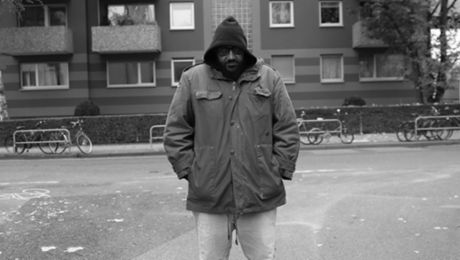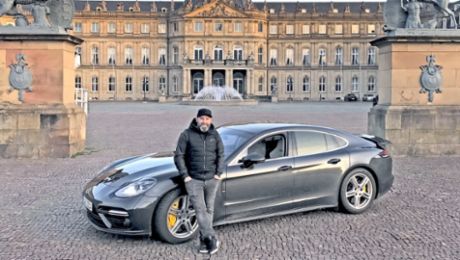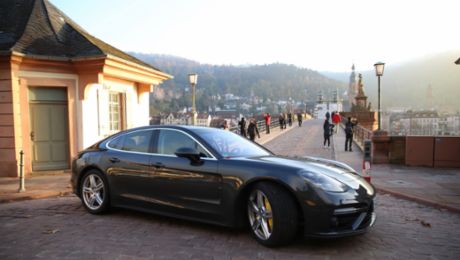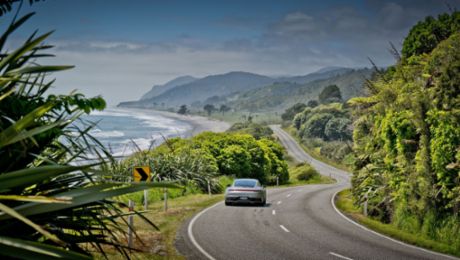Six cities, ten artists, a car and a good deal of rap: In a series of guest interviews on Porsche Newsroom, Niko Hüls, boss of the German hip-hop magazine Backspin, reports on his road trip across Germany. More impressions can be found on Instagram and Twitter using the hashtag #porschexbackspin as well as on the Backspin TV YouTube channel.
Berlin is a hip-hop metropolis. Graffiti artists, rappers, DJs, breakdancers and beatboxers all have a place in the cultural mosaic that is Germany’s capital city, and all have their meeting point: the Warschauer Brücke, the former Teufelsberg listening station on the hills of Charlottenburg, in the Gretchen nightclub in Kreuzberg, on a walk through the Osthafen docks or at the Urban Spree cultural centre. Rappers such as Sido, Bushido, Fler and Peter Fox have given Berlin a unique sound which has been moulded over many years, while the city’s streets are decorated with works of art from graffiti stars like Amok or 1UP.
Berlin: The hip-hop capital city
The capital city has an almost magnetic effect on artists and producers, who head to Berlin to produce their albums on the banks of the river Spree. This includes, for example, Philip Böllhoff, Sipho Sililo, David Vogt and Hannes Büscher, better known as the successful Beatgees team of producers. Their Berlin premises include the recording studio used by Curse, aka Michael Kurth, who was putting the finishing touches to his new album “Die Farbe von Wasser” during our #porschexbackspin tour and granted me exclusive insights behind the scenes.
When I think of Curse, then the first thing that comes to mind is his song “10 Rap Gesetze”, which appeared on the 2000 album “Feuerwasser”. The song is still a classic even now, as well as an essential mantra of my own ethos – because when all is said and done, “you have to love hip-hop as if the money doesn’t matter”.
You have to love hip-hop as if the money doesn’t matter
Whether it is his faith in Buddhism, his work as a yoga teacher, the early collaboration with the pop band Silbermond on “Bis zum Schluss” or making political statements alongside Gentleman on “Widerstand” – his self-reflective, intelligent and always experimental nature shapes the Westphalia native and his career even today. And that is why it is not a chore to meet Curse late one evening in Berlin and speak about his two latest projects in addition to hip-hop: a meditation and coaching podcast, as well as his own book, a 2018 publication from Rowohlt Taschenbuch.
Curse has played a crucial role in the history of hip-hop in Germany. He has released six studio albums, collaborated on the national stage with major artists such as Kool Savas, Dendeman, Max Herre and Marius Müller-Westernhagen and has taken part in international projects with The Roots and Promoe, playing electronic beats, piano ballads and creaking hooks, all with a voice that the ear is drawn to. For me, Michael Kurth is simply the hip-hop fan he sings about in his lyrics.
#WorkDriveBalance & the road trip playlist
Whether you're in a jam or cruising along, music can be a crucial factor in striking the right work-drive balance – just like the right vehicle. The pleasure of being behind the wheel can turn a stressful journey to an appointment into a positive experience. The Panamera is both a comfortable saloon and sports car rolled into one – the perfect vehicle for the Porsche hip-hop tour. To achieve the right work-drive balance, Niko Hüls has also created a playlist featuring the song “10 Rap-Gesetze” from Berlin artist Curse.
Save the date
While upon his road trip, Niko Hüls met many interesting characters, had in-depth discussions and gathered a great deal of information about the history of German hip-hop. You will be able to see the results in a video documentary co-produced by Porsche and Backspin TV: “Back to Tape” will be released in Spring 2018.
The author
Niko Hüls a.k.a. Niko BACKSPIN has been a fan of hip-hop since the early nineties. It was around the turn of the millennium that he made his passion into his job: Journalist, moderator and boss of BACKSPIN, Niko busies himself with urban youth culture and is always on the lookout for good stories and interesting people. Hip-hop as an art form and approach to life is Niko’s philosophy.
Consumption data
Panamera Turbo: Fuel consumption combined 9.4 – 9.3 l/100 km; CO2 emissions 214 – 212 g/km
.jpg/jcr:content/b-1O5A2031%20(1).jpg)
.jpg/jcr:content/b-1O5A1985%20(1).jpg)



